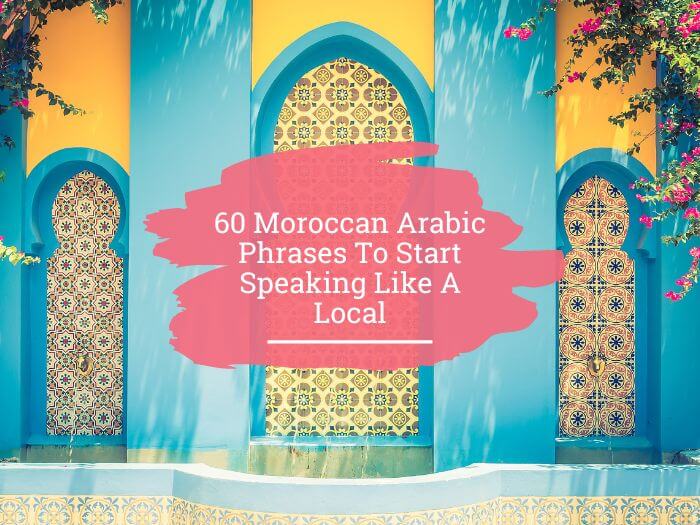Learning Arabic? Thinking about travelling to Morocco? The first thing you’ll want to learn is a few useful Moroccan Arabic phrases to get you going.
This is especially important when learning Moroccan Arabic, which is infamous among Arabic speakers for being the most different from the other Arabic dialects.
The last time I traveled to Morocco, knowing a few Moroccan Arabic phrases set me up for having a more meaningful experience, as locals were more quick to warm up to me when I knew a few uniquely Moroccan phrases.
So with that said, here’s a guide to 60 of the most useful phrases in Moroccan Arabic to get you speaking with confidence.
Pro Tip
By the way, if you want to learn Arabic (including Moroccan Arabic) through stories, not rules, then I have some great news for you!
My course, Arabic Uncovered, teaches you Arabic through the StoryLearning® method! It’s fun, easy, and effective! Get your free 7-day trial here.
Table of Contents
Before Getting Started With Moroccan Arabic Phrases
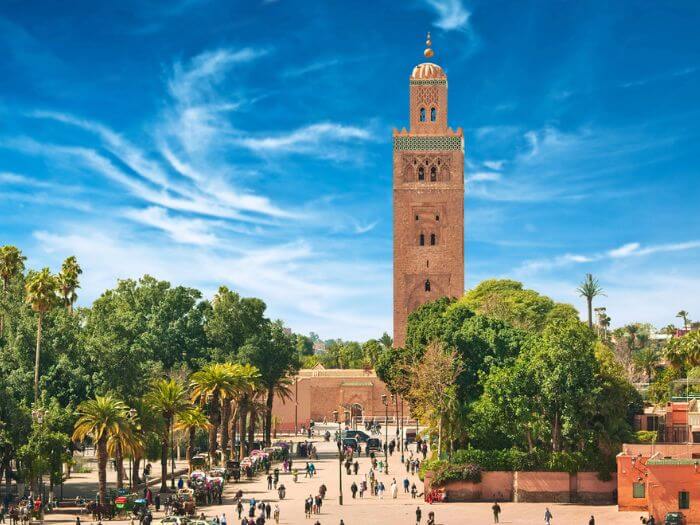
But before jumping into learning some of these phrases, it’s good to keep in mind a couple pointers about Moroccan Arabic and the Arabic language more broadly.
Even if you haven’t already learned the Arabic alphabet, that shouldn’t stop you from picking up a couple of Moroccan Arabic phrases or any in the other Arabic dialects.
But as a forewarning, it’s pretty common to come across different spellings of the same phrases. This is because some Arabic letters have no corresponding sound in the English language. So Arabic speakers might spell them in different ways when using the Latin alphabet.
In other words, there’s no “wrong” spelling of Arabic phrases when you write them out using the Latin alphabet. Instead, just focus on making sure you are pronouncing the right sounds in Arabic.
If you’re interested in learning more, check out this chat guide for more information on “Franco Arabic” (a mix between letters and numbers).
Differences Between Moroccan Arabic And Other Dialects
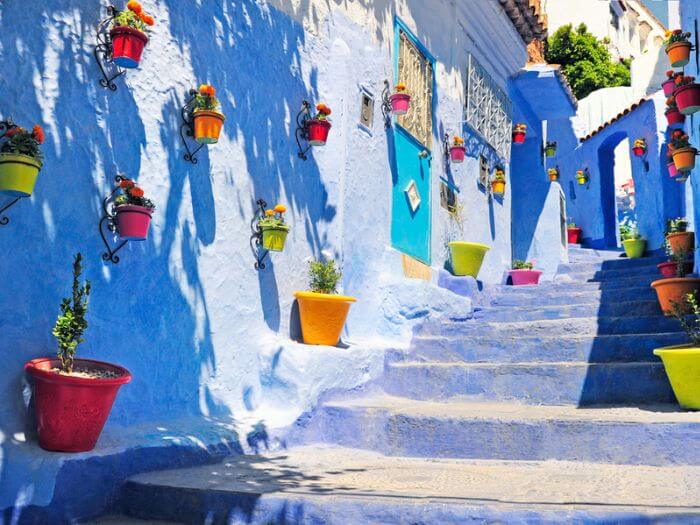
As I hinted earlier, Moroccan Arabic (also known as Maghrebi Arabic or Darija), is quite different compared to the other Arabic dialects. That’s because Moroccan Arabic is heavily influenced by other Berber languages like Tamazight, as well as French and Spanish.
With most native Arabic speakers, it’s pretty common to be able to generally understand each other, even without knowing the other dialect fluently. But this rule goes out the window with Moroccan Arabic.
Every time I speak with my Arabic-speaking friends from outside of Morocco or North Africa about Moroccan Arabic, they throw their hands up in the air and admit defeat!
That’s not to say that Moroccan Arabic is difficult to learn – it’s just different. So if you have the mindset going into learning Moroccan Arabic phrases that it’s like learning an entirely different language, then you’ll be setting yourself up for success.
Other pointers to keep in mind are that, like the other Arabic dialects, make sure you take into account conjugations of the phrases depending on the gender or the number of people you’re speaking with.
Lastly, some sounds in Moroccan Arabic aren't used in any of the other dialects. For example, you might come across words with the “پ” (p) or “گ” (g) letters which don't exist in the other Arabic dialects.
With that said, here’s a list of 60 Moroccan Arabic phrases.
Greetings In Moroccan Arabic
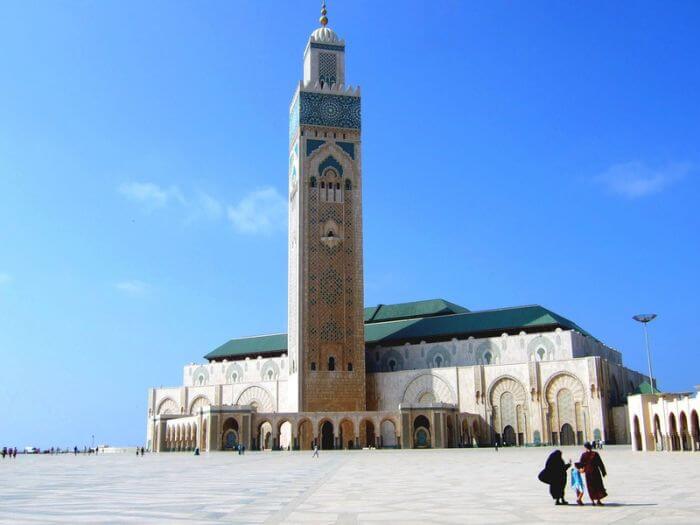
It goes without saying that knowing how to greet people will be useful from day one of learning Moroccan Arabic. The first greeting you say will be key to unlocking future conversations with peers so that you can become more fluent.
The last time I was travelling in Casablanca, I ended up pleasantly surprising the store vendors by starting our conversation with a Moroccan greeting.
One point to keep in mind with all Arabic greetings is that there are both greetings that are used across dialects, as well as greetings that are very specific to the dialect you're learning.
While other Arabic speakers will likely recognise the greetings used in other dialects, as a general rule of thumb, it’s worth learning in which context you would use certain greetings.
Here’s a list of the simplest greetings to get you started:
#1 – Hello (Peace be upon you) – As-salaamu ‘alaykum – السلام عليكم
#2 – Hello (and also with you) (response) – Wa ‘alaykum as-salaam – و عليكم السلام
#3 – Hi (Peace) – Selaam – سلام
#4 – Long time no see – Shehal hadi mashuftek – شحال هادي ماشفتك
#5 – Welcome – Merhba – مرحبا
Note that in some Arabic-speaking countries, Merhba / مرحبا can mean “hello”, so try not to let this trip you up. If it does, just remind yourself that you use both “hello” and “welcome” in similar situations. .
There are also a lot of greetings that you can use depending on the time of day. For example:
#6 – Good morning – SabaH lkhir – صباح الخير
#7 – Good morning (response) – SabaH lnoor – صباح النور
#8 – Good evening -Masa’ lkhayr – مساء الخير
#9 – Good evening (response) – Masa’ al-noor – مساء النور
#10 – Good evening – Layla sa3aida – ليلى سعيدة
#11 – Good night (when going to sleep) – Tisbah 3ala khayr – تصبح على خير
Fortunately, most of these greetings are used in Modern Standard Arabic and in the other dialects so you may have already encountered and learned them. But there are a few that are more commonly used in the Maghreb region, like Layla sa3aida / ليلى سعيدة (good evening).
Asking “How Are You” In Moroccan Arabic

Regardless of what language you’re learning, it’s pretty common practice and considered to be polite to ask the person you’re speaking with how they are doing before jumping into the conversation.
Just imagine how awkward it might be (depending on who you're talking to) if you immediately followed an exchange of hellos with a question about your homework from last week!
Asking the people around you how they are doing is considered polite among Arabic speakers, so here are a few ways of asking to get you started:
#12 – How are you? – Kidayr? (masculine)/ Kidayra? (feminine) – كيداير / كيدايرة؟
#13 – How are you? – La Bas? – لا باس؟
#14 – How are you? – La bas 3alik? – لباس عليك؟
#15 – Is everything going well? – Kolshi mezzian? – كلشي مزيان؟
#16 – Is everything fine? – Kolshi bkhir? -؟ كلشي بخير
You’ll also need to know the most standard responses to the question “how are you”. Interestingly, a lot of the standard responses in Moroccan Arabic take the original quesiton and simply turn them into a sentence, making for easily learning!
For example:
#17 – I’m good – Ana labas – انا لباس
#18 – I’m good, thanks be to God (all is well) – Ana Labas, Alhamdulillah – انا لباس الحمد لله
#19 – I’m good, thank you – Ana bkhir, shukran – انا بخير شكرا
#20 – Everything is going well – Kolshi mezzian – كلشي مزيان
#21 – Everything is fine – Kolshi bkhir – كلشي بخير
Moroccan Arabic Phrases For Being Polite
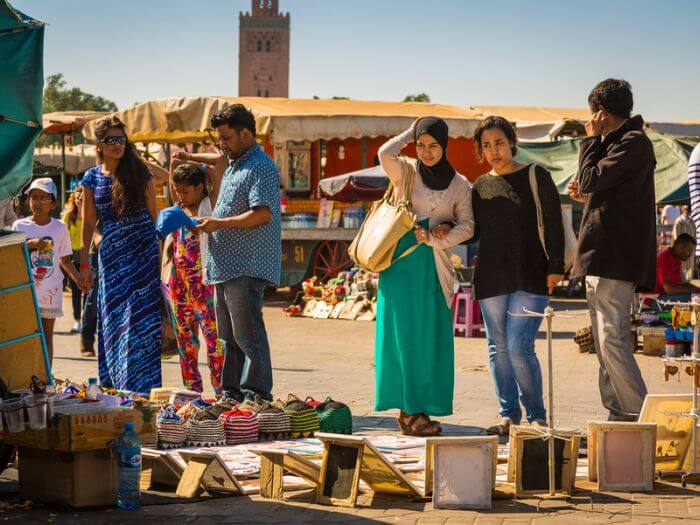
Being polite is very important in many cultures, but especially for Arabic culture. That’s why it goes a long way to know a few standard phrases that allow you to be polite towards the people around you.
Saying a simple “thank you” to the servers and cooks at the restaurants I frequented while visiting Morocco always helped to break the ice and have a warm conversation at dinner.
So with that said, here are a few phrases that enable you to be polite with your peers:
#22 – Thanks – Shukran – شكدا
#23 – Thank you very much – Shukran bizzaf – شكرا بزاف
#24 – Thank you – Shukran leek – شكرا ليك
In response, people may say to you:
#25 – You’re welcome – La shokran 3ala wajeb – لا شكرا على واجب
Other good phrases to know to be polite include:
#26 – I’m sorry/please – Smah liya – سماح ليا
#27 – Please – 3afak – عافاك
Getting To Know One Another In Moroccan Arabic

Now that you’ve mastered how to greet people and make a little bit of small talk, your conversation will likely turn to getting to know one another.
The first question that people might ask you is:
#28 – What’s your name? – Shno smitik? – شنو سميتك؟
In response, you can say:
#29 – My name is… – Smiti … – سميتي
If previous experience is any indication, you’ll then likely get a lot of questions like:
#30 – Where are you from? – Mneen nta/nti? – منين نتا؟
#31 – Where do you live? – Feen Katskoun? – فين كتسكن؟
#32 – What’s your job? – Shno lkhedma diyalik? – شنو الخدمة ديالك؟
The best thing to do at home is to practice saying some of the responses to these questions so that you can say them confidently when you’re out and about.
The standard responses can include phrases like:
#33 – I’m from… Ana mneen… – …أنا منين
#34 – I live in …. – Kansken f…….. – كنسكن ف…..
If you come from a culture that's more reserved or private, the personal questions might come off as rude. But just remind yourself that Arabic culture is warm and open, so it would be considered impolite not to ask these questions!
I remember when I first travelled to the Middle East, I was surprised by how quickly I received questions like this immediately after meeting people. But with time, I got used to it as well!
To round off the conversation, you’ll obviously want to tell people that it was a pleasure to meet them. You can do that by saying:
#35 – Nice to meet you – Mtsharfin – متشرفين
#36 – Nice to meet you – Tsharaft beek – تشرفت بك
#37 – You too (response) – Hita ana – حتا انا
Other Useful Daily Moroccan Arabic Phrases And Sentences
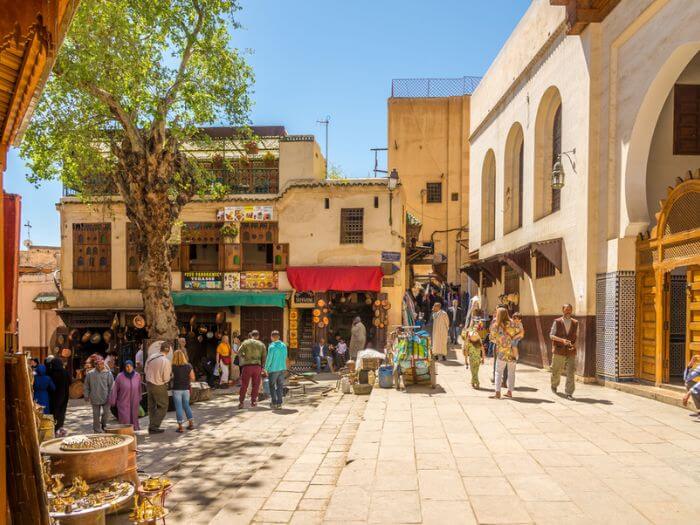
Beyond phrases for greeting and meeting people, there are tons of other useful phrases that would be good to have up your sleeve for surviving daily life in Morocco.
For starters, you might need to ask someone around you for help, whether it be for directions or recommendations. You can say:
#38 – Can you help me? – Wash Tqadar tawnee? – واش تقدر تعاوني؟
Let me just say that I can’t count the number of times I’ve had to use this phrase while travelling!
If you have the pleasure of helping someone else in your travels, then you can always answer by saying:
#39 – (It would be) My pleasure (response) – Bikull farah – بكل فرح
If you go to the market, you might find a new product that you’ve never seen. There are countless spices that I’d never even heard of until I visited Morocco! To get your questions answered, then you can ask:
#40 – What’s this? – Shno hada? – شنو هذا؟
If it’s something that you like and you’re interested in buying, then you can always ask:
#41 – How much is this? – Shhal hada/hadi? – شحال هادا / هادي
Let’s say you’re not feeling confident in speaking or understanding what someone has just said in Arabic, and want to communicate that you’re having trouble understanding or speaking. Here are some useful phrases for just this situation:
#42 – Could you say that again? – Taqdar tgola mara akhra? – تقدر تقول مرة اخدى؟
#43 – I don’t know Arabic. – Ma3arefsh / Ma3arfash 3arabiya . – معارفاش / معارفش العربية
Luckily, people in Morocco are very understanding, so they’ll probably say to you in response
#44 – No problem – Mashi mushkil – ماشي مشكل
Perhaps you’ve lost track of time and need to check the hour, but your phone has run out of battery. In this situation, you can always ask:
#45 – What’s the time? – Shehal f’sa3a? – شحال فالساعة؟
Last, but not least, you might want to speak with some friends to meet up or to make plans. Here are some simple sentences that can help you grow your friend circle:
#46 – What are you doing? – Shno kat3aml? – شنو كتعمل؟ً
#47 – Where are you going? – Feen ghadi? – فين غادي؟
One-Word Phrases In Moroccan Arabic
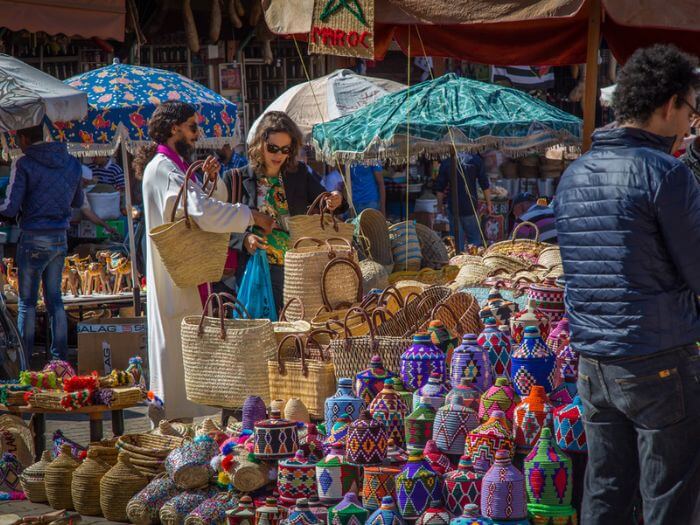
Some Moroccan Arabic phrases require a bit of effort to memorise. But there are others that you’ll hear so often that all you need to do to learn them is to keep your ears open to listening and learning.
These are the phrases that are said so often that you’ll find it impossible to go a day without hearing these words.
In fact, this is similar to the way the StoryLearning method works – when you read the same words and phrases over and over again in a story, you pick them up without having to study them.
Here are a few one-word phrases that you’ll hear so often that I’m sure you’ll pick up in no time:
#48 – Yes – Eeh – اي
#49 – No – La – لا
#50 – Okay – Wakha – وخا
#51 – Really? – Bissah? – ب الصّحّ
#52 – Of course – Taba3an – طبعا
#53 – Let’s go – Yallah – يلّ
#54 – Sounds good – Hadshi mzian – هادشي مزيان
Moroccan Arabic Phrases For Saying GoodBye

At the end of the day or an excursion, you may want to bid farewell to the people you met. After all, saying “goodbye” before leaving is the right thing to do!
The most simple way to say “goodbye” is:
#55 – Goodbye – Beslama – بسلامة
That said, there are a few other ways that you can say “goodbye” while opening up future possibilities to see each other again. For example:
#56 – Take care of yourself (See you next time) – T’halla f’rasek – تهلى فراسك
#57 – See you later! – Nshofkom men ba3ad – نشوفكم من بعد
I’ve found that people in Morocco responded best to me saying T’halla f’rasek/ تهلى فراسك because it is quintessentially Moroccan.
Depending on the time of day that you are saying goodbye, you can also use specific farewell phrases for certain times of day:
#58 – Wish you a good night – Kantmana lek leela zewina – كتمنى لك ليلة زوينة
#59 – Have a good evening, – Layla sa3aida – ليلى سعيدة
#60 – Have a nice day – Nharek mbrouk – نهارك مبروك
Master Moroccan Arabic Phrases Today!
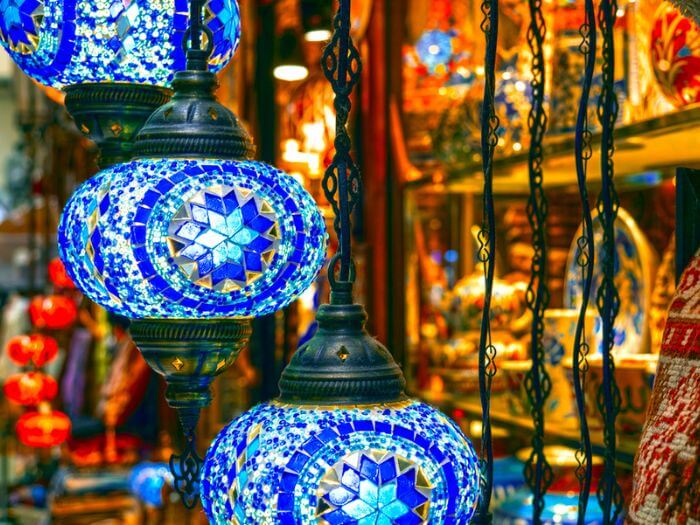
So there you have it – my guide to the 60 most useful Moroccan Arabic phrases!
I'm the first to admit that learning Moroccan Arabic phrases isn’t easy. Moroccan Arabic is pretty unique and stands out compared to the other Arabic dialects for being vastly different.
But don’t let this deter you! After all, a lot of the words used in Moroccan Arabic phrases are understood across dialects, even if they aren't used all the time.
My top tip for learning Moroccan Arabic while learning Modern Standard Arabic (MSA) is to learn them as two different languages. Once you have this mindset, you'll invest more time and effort in learning, and in doing so succeeded in learning both!
I hope that the phrases in this guide will help you get started in your journey to master Moroccan Arabic. After all, the phrases will help you unlock the journey to becoming fluent.
And if you’re looking for more ways to practice these phrases, then check out my course, Arabic Uncovered, which teaches you MSA and the dialect of your choice, including Moroccan Arabic, through the StoryLearning® method. Get your free 7-day trial here.

Olly Richards
Creator of the StoryLearning® Method
Olly Richards is a renowned polyglot and language learning expert with over 15 years of experience teaching millions through his innovative StoryLearning® method. He is the creator of StoryLearning, one of the world's largest language learning blogs with 500,000+ monthly readers.
Olly has authored 30+ language learning books and courses, including the bestselling "Short Stories" series published by Teach Yourself.
When not developing new teaching methods, Richards practices what he preaches—he speaks 8 languages fluently and continues learning new ones through his own methodology.
